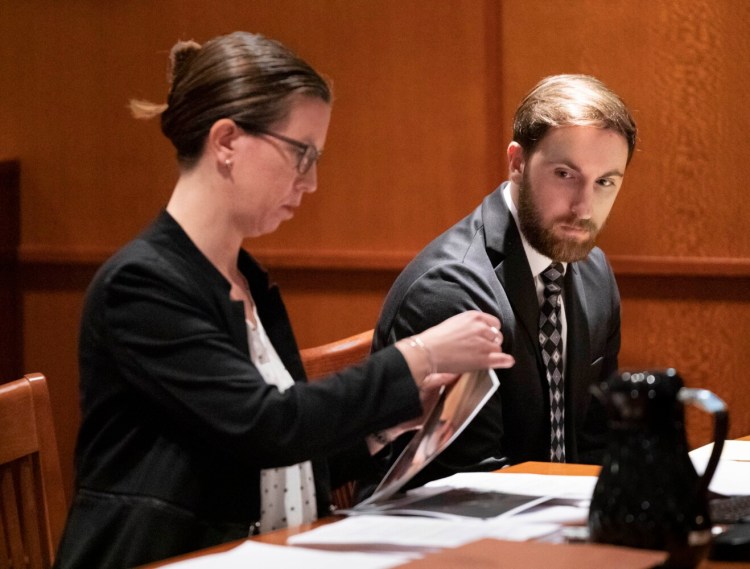A Portland man who says he acted in self-defense when he shot and killed his sister’s boyfriend has decided to take the case to trial before a judge.
Mark Cardilli Jr., 25, is charged with murder in the death of Isahak Muse, 22. He appeared at the Cumberland County Courthouse on Wednesday for a brief hearing on pending motions in the case. Among them was a request to waive his right to a jury trial and have a judge decide the verdict instead.

Isahak Muse
The prosecutors from the Maine Attorney General’s Office did not object, and Superior Court Justice Nancy Mills allowed Cardilli to sign the waiver. The trial is scheduled for December.
Cardilli has admitted to shooting Muse during an argument at his family’s Riverton home in the early hours of March 16, but he told police he acted in self-defense.
His attorneys, Matt Nichols and Sarah Churchill, did not explain in detail at the hearing or in the motion why they preferred a bench trial. But Nichols said in an interview that the defense team wanted to avoid any confusion on the legal questions at the heart of this case.
Cardilli’s attorneys will point to both self-defense and defense of premises as justifications for the shooting, which are both complicated ideas under Maine law.
“There’s not a whole lot of factual disagreements about what happened,” Nichols said. “There are some, but not a whole lot. But the legal issues in a case like this get a little bit tricky.”
Thea Johnson, an associate professor at the University of Maine School of Law, said the state’s law is stringent when it comes to use of deadly force.
During her criminal law course, Johnson said, her students study the case of Merrill Kimball, who fatally shot a man on a North Yarmouth bee farm in 2013. Kimball claimed he acted in self-defense, but a jury found him guilty of murder. She introduces that lesson by presenting the class with closing arguments in that case and then reading the jury instructions on self-defense.
The law students find that analysis to be nuanced and difficult, she said, and this case would be similar in that way even if the facts are not identical.
“The benefit of being before a judge versus a jury is that the law is incredibly complicated in this area,” Johnson said. “There are lots of moving pieces, and a judge will be able to understand the law better than a jury.”
A grand jury indicted Cardilli on the murder charge nearly three weeks after the shooting. Cardilli pleaded not guilty in April. He was released on $50,000 cash bail in May, a decision that prompted protests by supporters of the Muse family.
Court documents and testimony from the bail hearing have created an outline of the deadly confrontation at the Milton Street home.
Muse was dating Chelsey Cardilli, who was 17 at the time. When she asked if he could visit the house that night, her father said no. But when Muse arrived, the parents allowed him to stay until 1 a.m. When he did not leave at that time, a verbal and physical confrontation began between the five people in the house.
At some point during the argument, Cardilli went to his bedroom and came back with a gun. As the fight continued, Cardilli said Muse punched him in the nose. While Cardilli later told police he fired the gun into Muse’s chest in self-defense, a medical examiner reported that the fatal bullets hit the victim in the back.
The judge granted other motions at the hearing Wednesday, including a request for what is called “a view” at the house. Nichols said a sale is pending, and he asked the judge to visit the scene in person before the closing later this month, rather than closer to or during the trial. She agreed to do so.
Mills also considered a motion by an attorney representing Chelsey Cardilli. In June, the court took custody of the teenager’s journal, which had largely been written in the days after the shooting. The judge also issued a confidentiality order to prevent the parties from talking about any juvenile records in the case. So it is unclear what the journal says or whether it will play a role in the trial.
“Given that Chelsey never gave permission or authorization to anyone to have control or possession over her most private property – her journal – she asks the court to return it to her as it is private and personal and written during a time of intense pain and grief,” Gina Yamartino, Chelsey Cardilli’s attorney, wrote in the motion.
The judge agreed to make a copy of the journal for Chelsey Cardilli, but she said the original would remain with the court until after trial to avoid any issues about authenticity.
Mark Cardilli’s parents attended the hearing, but his sister did not. An advocate from the Maine Attorney General’s Office sat on the other side of the courtroom with two women representing the Muse family.
The trial is scheduled to begin Dec. 9.
Comments are not available on this story.
Send questions/comments to the editors.


